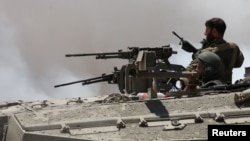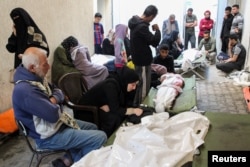The operation “will continue as additional forces will enter” the Rafah area, Gallant said. “Several tunnels in the area have been destroyed by our troops,” he added. “This activity will intensify.”
“Hamas is not an organization that can reorganize, it does not have reserve troops, it has no supply stocks and no ability to treat the terrorists that we target,” Gallant said. “The result is that we are wearing Hamas down.”
Israeli forces earlier this month took control of the Gaza side of the Rafah crossing with Egypt, despite objections from Israel’s key ally the United States over concerns about civilian safety.
According to the United Nations agency for Palestinian refugees, 600,000 people have fled Rafah since military operations intensified there. Meanwhile in northern Gaza, recent Israeli evacuation orders have so far displaced at least 100,000 people, according to the UN.
The United States has expressed concern about the lack of any reliable Israeli strategy to protect civilians in Rafah, while Israel has depicted the southern Gaza city as the last Hamas stronghold.
On Sunday, U.S. Secretary of State Antony Blinken told NBC that “Israel’s on the trajectory, potentially, to inherit an insurgency with many armed Hamas left or, if it leaves, a vacuum filled by chaos, filled by anarchy and probably refilled by Hamas.”
The Egyptian government has also expressed concern about Israeli operations in Rafah, with Egyptian President Abdel-Fattah el-Sissi saying on Thursday that Israel has sought to "solidify its siege on the Gaza Strip” by taking the Gaza side of the Rafah crossing.
Addressing an Arab League summit in Bahrain, the Egyptian president also accused Israel of sabotaging cease-fire negotiations. Egypt is one of the primary mediators between Israel and Hamas.
Israel “continues to engage in evasive actions to shirk its responsibilities and in devious maneuvering, around efforts to achieve a cease-fire,” he said.
Israel’s military said earlier Thursday five of its troops were killed by Israeli tank fire in the northern Gaza Strip.
The military cited tank crossfire in the incident and said three other soldiers were injured.
The deaths bring the number of Israeli troops killed to 273 since the war began in October.
Also Thursday, the U.S. military reported that the installation of a temporary pier anchored to a beach in Gaza was complete, which will allow for a new route to bring humanitarian aid into the Gaza Strip.
U.S. Central Command said aid trucks “are expected to begin moving ashore in the coming days,” and that the United Nations will be in charge of receiving shipments and coordinating distribution.
The new maritime aid route involves several steps, with aid first undergoing inspection and security checks in Cyprus. Loads are then being taken to a U.S.-built floating pier off the Gaza coast and transferred onto trucks, with smaller boats taking the trucks to the newly anchored pier on the Gaza coastline.
The arrangement is part of an effort to boost what aid organizations say is a vastly insufficient amount of food, medicine and other supplies for Palestinian civilians. Some aid groups have said the maritime corridor is not the best solution, arguing that boosting flows of aid through land crossings would be far more effective.
Gallant assailed Prime Minister Benjamin Netanyahu Wednesday for failing to devise a plan to govern Gaza after the end of Israel’s war with Hamas. But the Israeli leader said it was pointless to do so until the militants are defeated.
In an unusual rift between the two leaders, Gallant said in a televised statement that he is opposed to the establishment of either Israeli military or civilian control of the narrow Gaza Strip along the Mediterranean Sea that is home to about 2.3 million Palestinians.
“Since October, I have been raising this issue consistently in the Cabinet, and have received no response," Gallant said.
"I call on Prime Minister Benjamin Netanyahu to make a decision and declare that Israel will not establish civilian control over the Gaza Strip," Gallant said, calling for an immediate "governing alternative to Hamas.”
With the October 7 Hamas attack on Israel and Israel’s subsequent ongoing counteroffensive on Hamas militants in Gaza, Netanyahu has repeatedly declined to lay out a post-war plan for governance in Gaza.
The United States, Israel’s chief arms supplier, has called for a revitalized Palestinian Authority to govern both Gaza and the West Bank in a two-state solution, Palestine alongside Israel.
But Netanyahu and his right-wing governing coalition adamantly oppose such a solution. The prime minister said any discussion of how Gaza should be ruled after the seven-month war was just "empty talk" if Hamas remains in the territory.
"The first condition for preparing the ground for another entity is to destroy Hamas, and to do so without making excuses," Netanyahu said in the statement posted on his Telegram channel.
Gallant said the current military action in Gaza needed to be followed by political action.
"The day after Hamas will only be achieved with Palestinian entities taking control of Gaza, accompanied by international actors, establishing a governing alternative to Hamas' rule," he said.
"This, above all, is an interest of the state of Israel,” Gallant said.
Israel's far-right National Security Minister Itamar Ben-Gvir, a member of Netanyahu's ruling coalition, attacked Gallant over his views. Ben-Gvir characterized Gallant as “the minister of defense who failed on October 7 and continues to fail today. Such a minister of defense must be replaced in order to achieve the goals of the war,” he said.
The war was triggered by the October Hamas terror attack on Israel that killed 1,200 people and led to the capture of about 250 hostages, according to Israeli officials.
Israel’s subsequent counteroffensive in Gaza has killed more than 35,200 Palestinians, according to the Gaza Health Ministry, which includes civilians and combatants in its count, but says most of the dead are women and children.
Israel says it has killed more than 14,000 militants and around 16,000 civilians.
Some information for this report came from The Associated Press, Agence France-Presse and Reuters

